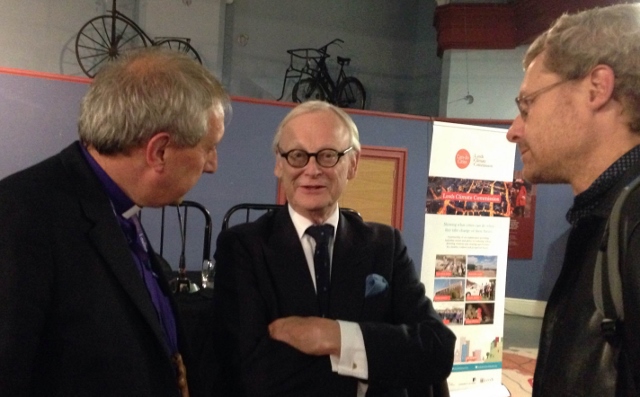The diocese is playing its part in a pioneering Climate Commission launched in Leeds this week to encourage investment in low-carbon, climate-resilient developments which could save cities millions of pounds.
 Launched on Thursday (September 7) by former Environment Secretary and current chair of the UK Committee on Climate Change, Lord Deben (John Selwyn Gummer), it harnesses the capacity of 24 key businesses and organisations (eg Yorkshire Water, the NHS, house builders, transport providers and community groups).
Launched on Thursday (September 7) by former Environment Secretary and current chair of the UK Committee on Climate Change, Lord Deben (John Selwyn Gummer), it harnesses the capacity of 24 key businesses and organisations (eg Yorkshire Water, the NHS, house builders, transport providers and community groups).
Bishop Paul Slater, a member of the Leeds Climate Commission, said: "Caring for God's earth and being a good steward of our resources is an important plank of any rounded Christian theology and we are ready to help across the communities of Leeds in which we serve.
"The church has a relatively small carbon footprint in the city but the Anglican Diocese of Leeds (in addition to The Green Journey, a renewable electricity supply switching service for churches) has commissioned its own carbon calculator, suited to places of worship, which will enable individual churches to assess their carbon footprint and make reductions”.
Energy survey of UK cities reveals we’re overpaying by £7bn a year
Leeds could save £272 million - £349 per person
Alongside the launch of the Leeds Climate Commission the University of Leeds have completed the most comprehensive survey yet of cities’ energy-saving capabilities which shows they are failing to capitalise on profitable opportunities which could slash costs for houses, schools, hospitals and businesses by billions of pounds, saving an average of £300 per year for every person in the 50 cities.
In London alone, cost-effective measures would see more than £2 billion wiped off a total yearly energy bill of more than £11 billion by 2026, and carbon emissions would fall by 23.5 per cent over and above current predictions as a result.
The pattern is repeated across the country, with the new research identifying a host of opportunities for investment which could play a huge part in stimulating the economy as well as safeguarding the public against climate change.
The study, carried out at the University of Leeds, assessed the total energy bills of the UK’s 50 biggest cities – which currently amount to over £35 billion a year, and average £1,500 per person. It found that simple, profitable improvements to heating, lighting, insulation, appliances and vehicles would reap extraordinary results for their 23.5 million citizens.
The manufacturing, installation and maintenance involved in implementing these improvements would create the equivalent of 90,000 new man-years of employment in the 50 cities, while carbon emissions from these cities would be cut by almost a quarter more than currently expected.
The up-front cost of the changes would total less than one per cent of GDP annually for the next ten years. Measures such as more efficient lighting in homes or cooling in retail buildings would cover their costs in approximately a year and generate profits thereafter.
“There is so much more we could and should be doing to unlock these opportunities,” said Professor Andy Gouldson, who led the study from the ESRC Centre for Climate Change Economics and Policy at the University of Leeds.
“All cities are struggling to deliver things like low-carbon strategies in the face of spending cuts, but we’ve proved that garnering investment in practical energy-saving measures is a win-win for all involved. Industry wins, local authorities win, householders win and the climate wins.”
But Prof Gouldson argues that it won’t happen without some facilitation from central government and a change in the way that local authorities try and do things. “Central government would normally fall over themselves to deliver an economic stimulus package or an infrastructure investment on this scale, but they’re not doing that here, perhaps because of austerity and a sense that climate change is economically too challenging,” he said.
“And local government feels that it can’t do these kind of things anymore, given the scale of the cuts they’ve had to face.”
However, Prof Gouldson argues that with some lateral thinking they could still do it. “The harsh reality is that we can’t rely on local government to take the lead anymore – but if the public, private and third sectors in a city come together, they can find new ways to get things done.” Whis is what is happening in Leeds with the newly launched, pioneering Climate Commission.
Leeds City Council leader Councillor Judith Blake said: "It will ensure that organisations across the city come together and really make a move to cut the city’s energy bill and look at how we can pass these savings on to households.”
A new website – ‘Can-do Cities’ - encouraging others to follow Leeds’ example has been launched at candocities.org. It sets out the economic case for low carbon development not only for Leeds, but for each of the UK’s 50 biggest cities and for all local authorities across the UK.